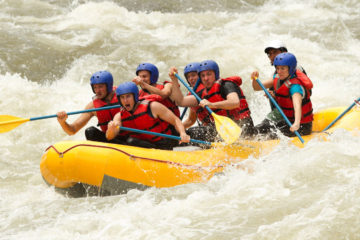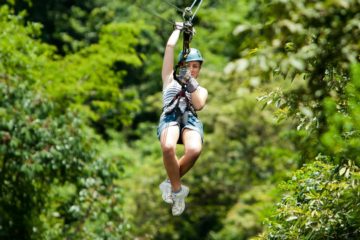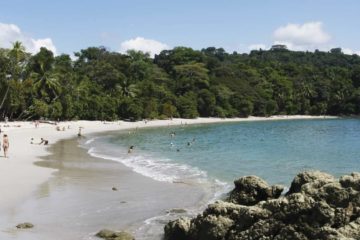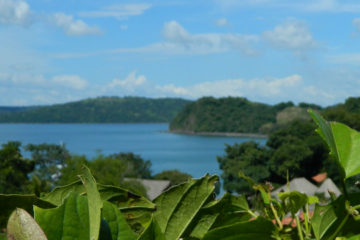Weather:
Beach and lowland coastal areas are generally hot during the day with daytime averages in the mid-80s to mid-90s and nighttime temperatures in the mid-70s to lower 80s. Guanacaste, enjoys mostly dry weather from November through August with longer lasting rains during the months of September and October
In the Northern Plains, where the Arenal Volcano is located, travelers can expect little cooler temperatures usually around the low 70s to mid-80s and overnight temperatures in the mid-60s to upper 70s. The weather is fairly unpredictable in terms of rain, but generally the drier months are January through Mid-August.
What to pack:
- Insect repellant
- Quick dry shirts are recommended
- Clothes for sun protection
- Swimsuit
- 1 pair of long pants for hiking
- 1-2 long sleeve shirts for protection from the sun or hiking through higher elevation forests
- 2-3 pairs of quick dry shorts for general use
- Rain jacket – It should be lightweight and breathable
- Brimmed hat for protection from the sun
- Hiking or walking shoes dependent on the level of activity in your vacation
- Sandals or flip flops
- You may also want to consider amphibian hiking shoes or reef/river sandals depending if you plan on doing land/water activities such as rafting or canyoning
- Camera
- Dry bag
- Water bottle
- Binoculars
- Sunglasses
- Sun screen – waterproof and at least SPF 20
- Passport
- Driver’s license
- Money – everybody accepts U.S. dollars or you can exchange for Costa Rican colones
- Credit or debit card
- Insurance card along with contact information
- The roads in Costa Rica are generally windy and mountainous. Take Dramamine prior to your transfer to alleviate motion sickness.
- Prescription medicine - You should bring the medicine with you may experience difficulty finding it here.
- Prescription glasses or contact lenses and cleaning solution sunglasses
- Imodium® in case of diarrhea
- Pain relievers and or fever reducers such as Aspirin, Ibuprofen, or Acetaminophen
- Vitamins if you normally take them
* Packing Tip: Rolled clothing condenses better than folded clothing
Electricity:
North American appliances are compatible with Costa Rica's electrical system (110 volts) and outlets (parallel two-prong). Most laptops operate equally well on 110 and 220 volts and so require only an adapter, but you should bring a surge protector for your computer.
Never use an outlet that specifically warns against using higher-voltage appliances without a
transformer. Dual-voltage appliances (which are usually designed especially for travel) need only a two-prong adapter.
Health:
- Malaria is not a problem in Costa Rica.
- Government facilities -- the so-called "Caja" hospitals (short for Caja Costarricense de Seguro Social, or Costa Rican Social Security System) -- and clinics are of acceptable quality.
- Private hospitals are more accustomed to serving foreigners. They include Hospital CIMA, Clínica Bíblica, and Clínica Católica, which all have 24-hour pharmacies.
- The long-established and ubiquitous Fischel pharmacies are great places for your prescription needs.
- Antibiotics and psychotropic medications (for sleep, anxiety, or pain) require prescriptions in Costa Rica.
Food & Drink:
Most food and water is sanitary in Costa Rica.
Although it may not be necessary, you can stay on the safe side by avoiding uncooked food,
unpasteurized milk (including milk products), and ice -- ask for drinks sin hielo (without ice) -- and by drinking bottled water. Drink plenty of purified water or tea; chamomile (manzanilla in Spanish) is a good folk remedy.
Vegetarian meals are available if requested, but other specialty meal requests may be able to be provided if it is informed previously, however it will be guarantee according to availability. Specialty meals will be available according to the facilities of each destination and may be not always available.
Soft drinks and alcoholic beverages are not included in the program.
How much does food cost?
The cost of meals depends on where and what you choose to eat. Prices can vary significantly and you should be aware if the sales and service taxes are included in the meal or not.
If you eat lunch at a local restaurant and order a "typical casado" which is usually comprised of your choice of fish, pork, chicken or beef with rice, salad and along with a juice or water, you can expect to pay around 3,000 colones (about $6 USD) including sales tax and gratuity. A dinner meal such as a decent steak or fresh fish with a couple sides will cost around 5,000 colones (around $10).
There are also restaurants that cater to tourists. These are generally nicer establishments and you can expect to pay more at these restaurants. The average lunch with a sandwich, fries and drink will cost around 5,000 colones ($10). The average dinner – say spaghetti, pizza, steak, roasted chicken, or a rice and shrimp plate will cost around 7,500 colones ($15). Prices can go up depending on how elegant the restaurant is.
Drink prices can vary significantly depending on where you go. You can expect to pay around $2 for a beer or $3 for a cocktail at a typical Costa Rican bar. Drinks can cost two to three times that amount at larger restaurants or resorts. Juices and sodas cost about the same amount you would pay in the United States ($1.50). A 20 ounce bottle of water will cost about 500 colones ($1.00).
Shots & Medications:
Most travelers to Costa Rica do not get any vaccinations or take any special medications. Check with the CDC for detailed health advisories and recommended vaccinations.
Internet:
Internet services are available almost everywhere in the Country. Some hotels offer wireless internet access as complimentary, and other hotels will have an extra charge for it.
Currency:
In general, Costa Rica is cheaper than North America or Europe. The Costa Rican currency is
called Colon (¢). US dollars and major credit cards are widely accepted. Actually, the currency exchange value is $ 1.- (one US dollar) for ¢ 570 to ¢ 612 colones.
Nearly all vendors accept the US dollar, but will usually give you change in colones. It is not
considered impolite to pay in US dollars, in fact most tourism businesses encourage you to pay in dollars.
How much money should I carry with me?
This all depends on what your plans are. If you are going souvenir shopping or out for a meal and do not plan on using a credit card, $100 or 50,000 colones is a good amount. If you are just leisurely strolling or going to the beach, $20 or 10,000 colones is sufficient.
Any money that you do not carry with you should be locked in your room safe. You can also use an ATM in most destinations. However, if you plan to use an ATM, you must contact your bank to inform them of your upcoming trip before you come to Costa Rica.
Taxes:
All Costa Rican businesses charge a 13% sales tax. Restaurants add 13% tax and 10% service fee to meals. Tourists are not refunded for taxes paid in Costa Rica. Departure tax is $29.00, can be paid in US Dollars, Colones or with a credit card. This is to be paid directly at the airport as it is part of your flight.
Tipping:
Costa Rica doesn't have a tipping culture, but positive reinforcement goes a long way to
fostering a culture of good service, which is hit and miss. Tip only for good service.
Tour Guides - $2 – $5 per person, per guide
Shuttle Driver - $2 – $5 per person
Private Transportation - $10 – $20 per group, per trip
Housekeeping – $2 per night
Restaurant bills include a 13% tax and 10% service charge -- sometimes these amounts are
included in prices on the menu, and sometimes they aren't. If the menu doesn't indicate whether service is included, ask. An additional gratuity is not expected, especially in cheap
restaurants, but people often leave something extra when service is good.
Taxis:
Taxis are readily available in most tourist destinations.
The average cost is between $1 -$1.50 per kilometer, though can be higher in areas with unpaved roads such as Monteverde (it is paved in town, but not in the surrounding areas).
Only use registered cabs with proper licensing. Your hotel will know the best taxi drivers and can assist with this.
Calling Outside Costa Rica:
The cheapest way to call internationally is to either call from a pay phone using an international phone card; call from a pay phone using your own long-distance calling card; or call from a telephone office. Dialing directly from a hotel room is very expensive, as is recruiting an international operator to connect you. Watch out for pay phones marked Call USA/Canada with a credit card. They are wildly expensive.
To call overseas directly, dial 00, then the country code, the area code, and the number. You can make international calls from almost any phone with an international calling card purchased in Costa Rica. First dial 199, then the PIN on the back of your card (revealed after scratching off a protective coating), then dial the phone number as you would a direct call.
When requesting a calling card from your phone provider, ask specifically about calls from Costa Rica. Most 800-number cards don't work in Costa Rica. Callingcards.com is a great resource for prepaid international calling cards. At this writing, it lists at least one calling-card company with rates of 1¢ per minute for calls to the U.S.
You may find the local access number blocked in many hotel rooms. First ask the hotel operator to connect you. If the hotel operator balks, ask for an international operator, or dial the international operator yourself. To reach an English-speaking operator, you'll have more luck dialing the international operator (tel. 175 or 116). One way to improve your odds of getting connected to your long-distance carrier is to sign up with more than one company: a hotel may block Sprint, for example, but not MCI. If all else fails, call from a pay phone.
AT&T, MCI, and Sprint access codes make calling long-distance relatively convenient but can be very expensive.
To make a collect call from any phone, dial 09 (instead of 00 for a regular call), the country code for the country you're calling, and then the number.
Cell Phones:
If your cell phone has service to Costa Rica, you theoretically can use it here, but expect reception to be impossible in many areas of this mountainous country. Companies such as T-Mobile, AT&T, and Sprint offers roaming services in Costa Rica.
Phone Cards:
Most public phones require phone cards (for local or international calls), but phone cards can also be used from any nonrotary telephone in Costa Rica, including residential phones, cell phones, and hotel phones. It's rare to be charged a per-minute rate for the mere use of the phone in a hotel.
Phone cards are sold in an array of shops, including supermarkets, post offices, offices of the Costa Rican Electricity Institute (ICE), and at any business displaying the gold-and-blue tarjetas telefónicas sign. International cards tend to be easier to find in downtown San José and in tourism areas.
With tarjetas para llamadas nacionales (domestic calling cards), cards are available in
denominations of 500 colones and 1,000 colones. Phone- card rates are standard throughout the country, about 2¢ per minute; a 500-colón card provides about 50 minutes of landline calls.
This decreases sharply if calling a cell phone; rates vary. Tarjetas para llamadas internacionales (international calling cards) are sold in $10, $20, 3,000-colón, and 10,000-colón amounts (denominations are inexplicably split between dollars and colones). It's harder to find the 10,000-colón cards; your best bet is to try a Fischel pharmacy or an ICE office.
Some public phones accept tarjetas chip ("chip" cards), which record what you spend, though they're a dying breed. Avoid buying chip cards: they malfunction, you can use them only at the few-and-far-between chip phones, and they are sold in small denominations that are not sufficient for international calls.
Entry Requirements to Costa Rica:
A passport that is valid for at least 6 months after your arrival to Costa Rica.
Citizens holding valid passports from the following countries are permitted to stay in Costa Rica for 90 days without a visa:
Argentina, Austria, Belgium, Brazil, Canada, Denmark, Finland, France and Germany
dependencies, Greece, Holland and dependencies, Hungary, Israel, Italy, Japan, Liechtenstein, Luxembourg, Norway, Panama, Paraguay, Poland, Portugal, Puerto Rico, Romania, South Korea, Spain, Sweden, Switzerland, Trinidad & Tobago, United Kingdom, United States of America, Czech Republic and Uruguay.
Citizens holding valid passports from the following countries are exempt from all visa
requirements for stays of 30 days in Costa Rica, though once inside the country, they can apply for extension from the Immigration office, for an authorized period of stay of 90 days:
Antigua & Barbuda, Australia, Bahamas, Barbados, Belize, Bolivia, Bulgaria, Chile, Dominica, El Salvador, Grenada, Guatemala, Guyana, Honduras, Iceland, Ireland, Jamaica, Kenya, Mexico, New Zealand, Philippines, Russia, Saint Kitts/Nevis, San Marino, St. Lucia, St. Vincent, Singapore, Slovakia, South Africa, Suriname, Taiwan, Turkey, The Vatican, Venezuela, Estonia and Monaco.
Citizens of all countries not listed above are required a visa from a Costa Rican embassy or
consulate before traveling.
As in most of the countries, in order to visit Costa Rica, the traveler must show his or her
passport. The passport must be valid during the following 6 months from the entry date to Costa Rica.
Search Tours
Find your dream tour today!
Adventurous Costa Rica
-CRN-A001- Eight days of adventure in Costa Rica! Let your adventure spirit free and enjoy the adventure surrounded by the
Naturally Thrilling
-CRN-A002- A week of marvelous memories in Costa Rica! Get in touch with nature and enjoy many adventures at the
Natural Paths
-CRN-N002- Eight days of wildlife and nature! Discover the beauty of the rainforest while you let your soul fall in
Beach and Jungle
-CRN-U002- Immerse in the exotic beauty of the tropical jungle and relax at the beautiful beach of Manuel Antonio. Experience
Romance in Paradise
-CRN-R001- Eight days of love and romance in Costa Rica! Let your souls enjoy the magical feeling of love surrounded
Exotic Getaway
-CRN-R003- Enjoy an adventurous time at the cloud forest of Monteverde and explore the lush sceneries of Manuel Antonio National







